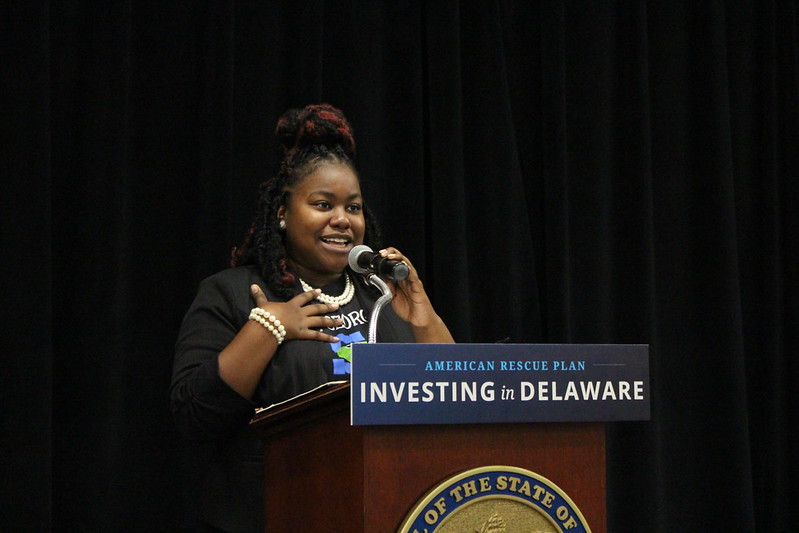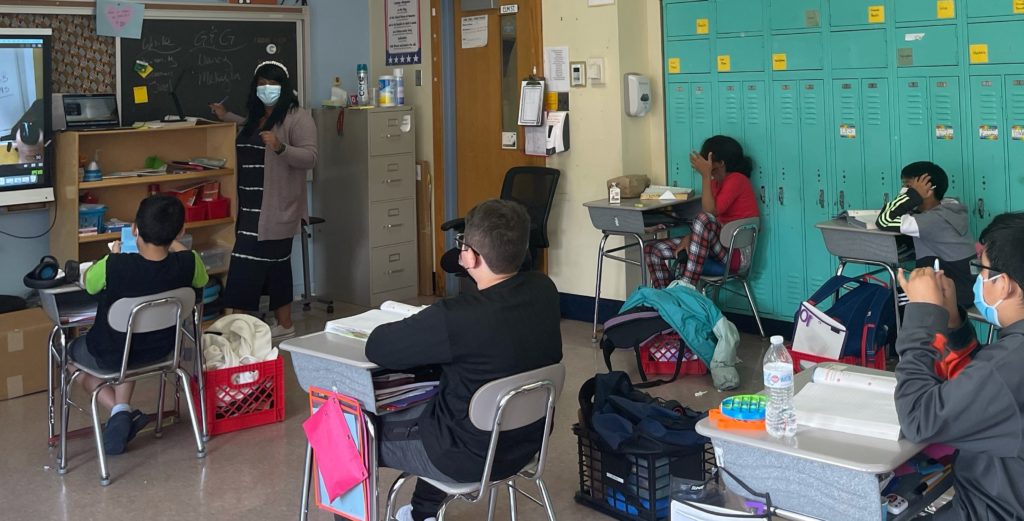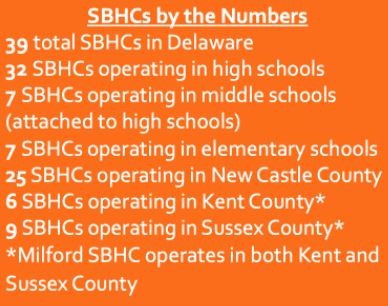
Imani Wulff Cochrane, a student at St. Georges Technical High School, was the undisputed hit of Gov. Carney’s announcement this month regarding a $50 million in workforce training.
The teenager spoke passionately about the joy she feels while working and learning on-the-job at St. Georges’ in-house preschool center, where students provide quality care for three- and four-year-olds.
When Imani graduates, she’ll do so with college credits and a plethora of professional certifications (infant, toddler and adult CPR and first aid; early learning foundations; training and early care in education one and two; and an intern certification in early childhood and school aged care, for those following along at home).
Imani’s story is increasingly becoming the norm in a new era of high school career prep, where young people accrue job experience, professional credentials, and college credits.
Rodel caught up with Imani between classes earlier this month.
Click below to hear Imani’s remarks from the October 5 event.
You brought the house down at Gov. Carney’s announcement earlier this month. How did that feel?
I was a little nervous. I really do enjoy presenting in front of people, so it was really fun. It was a good experience for me.
Where did your interest for something like early childhood education come from in the first place?
From being surrounded by so many educators that were inspiring and really affirming my brilliance. And I really think that once I realized that education was more than just coming to school and teaching, but it was more being a motivation, being an inspiration in somebody’s life, that’s where I really wanted to be.
How does your normal school day works. St. Georges has an in-school preschool center…did I hear that right?
We have a preschool at St. George’s. I start off with my regular courses, I take chemistry in the morning, and then I transition into early childhood for three periods of my day. I’m currently not co-oping, but traditionally students will co-op in that region, go out into the workforce, work in your career area.
I go into the preschool at St. George’s, and then I work with several children and we basically prepare lesson plans for them, and then we execute that in the classroom.
And the students run the show more or less?
Yes, absolutely. Preschool is held on Tuesday, Wednesdays and Thursdays. Mondays and Fridays, we use those as lesson planning days and all we do is lesson plan and integrate their learning into our lessons. And then we evaluate what kind of domain it would fit, so is it social emotional learning, letters, math, where would it be?
Then, as teachers, we write the script because we need to make sure that we’re saying the right things when we are communicating with the children. And then we practice in the back and then it’s shown in our preschool.
How important to you is it to have this sort of hands-on experience?
It’s different learning from textbooks versus actually being there and being able to actively engage with students. I think that sometimes reading in a textbook makes teaching look so easy, but really, it’s really not.
When you realize how many factors go into actually being a teacher and an educator, you realized that you have to really know what you’re doing, you have to understand your lessons. And sometimes the textbook doesn’t provide you with that type of process. I wouldn’t know that in order for the students to understand, I have to be on their level. When we talk to them, we don’t stand over top of them, we sit with them and talk. So I think it’s a different experience.
Where do you think your passion for being an educator came from?
When I first came in, I was very nervous, a little unsure if I really wanted to take the education route, but being able to have that hands on learning really allowed me to recognize, this is something that I really want to do. I really enjoy, maybe not so much the lesson planning aspects of it all, but the execution part is what I love the most, and that’s what being a teacher and an educator is about.
I think that I’ve always been that person. People always used to tell me I act like a mom. What they were really saying was I had a nurturing spirit. So I stopped getting offended by that. I think it was actually a good thing that I had a nurturing spirit, because that meant that I could reach more people.
And what kinds of postsecondary benefits are you getting from this?
When I graduate, I will leave with college credit, because I’m doing dual enrollment, my diploma, and I will have two certifications in early childhood, which enable me to work after high school, if I choose. I do plan on taking the college route, but I would still be able to work and be a college student, in a preschool setting.
I believe I’m going to college and I want to major in education. I’m thinking I can do the work in a few years to really make sure that I am advocating for equity, inclusion and diversity within education.




